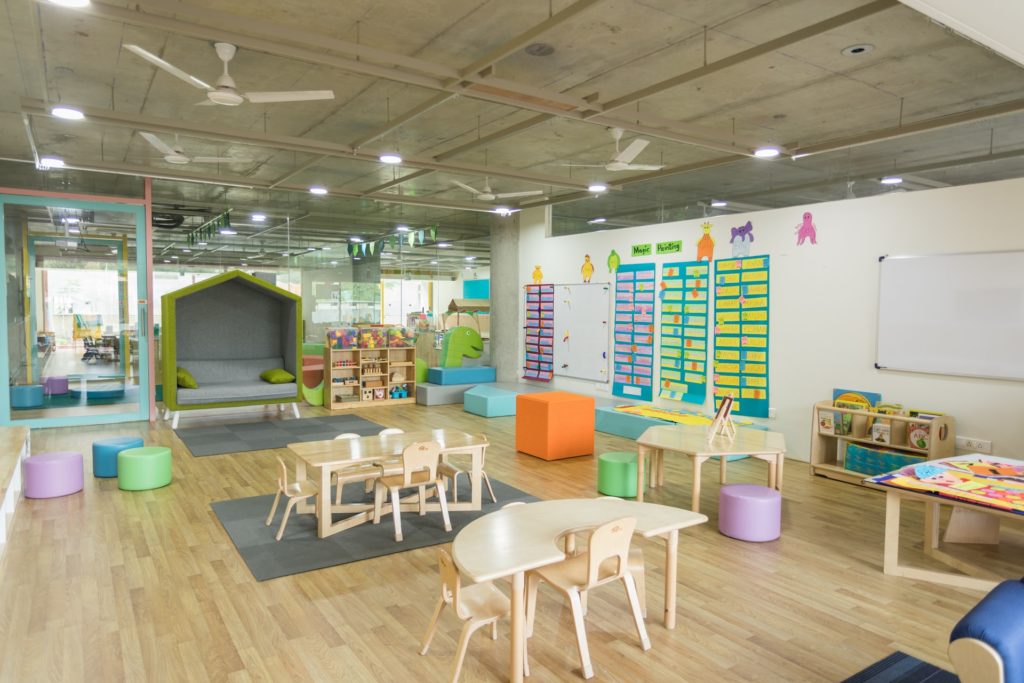German School & Childcare Names Posted by Constanze on Sep 16, 2020 in Culture, Language
Guten Tag! As schools are starting up again, I thought it’d be good to give you a run-down of words used in the German school and childcare system. I hope you find this list useful, and that it will clear up any confusion you may have around some of the names (for example: what’s the difference between a Krippe, a Kindergarten, and a Kita? And why are there four different kinds of secondary schools in Germany?). Enjoy!
German School & Childcare Names
Die Kinderkrippe – Creche
The Kinderkrippe is often simply called ‘die Krippe’, and is for babies and children up to 3 Jahre alt (3 years old). The word Krippe is also the German word for crib.
Der Kindergarten – Kindergarten/playgroup
The Kindergarten is a pre-school for children 3-6 Jahre alt (3-6 years old). But the word Kindergarten needs no explanation really, as it is familiar already- it is a loanword that has been used in English for a long time. See this post to read more about loanwords!
Die Kita – Daycare centre
The Kita is for children up to 12 Jahre alt (12 years old). The word is short for die Kindertagesstätte – ‘children’s day place’. It is a portmanteau word that uses the KI from Kinder and the TA from Tages to create a shortened version of itself. Read more about portmanteau words here!
Der Schulhort – After-school activity centre
Sometimes known as ‘der Hort’, this is an after-school club for children.
Das Au-Pair – Au pair
Again, pretty self-explanatory! One thing to note is that the gender of the Au pair is often specified in the name: das Au-Pair-Mädchen for a female, and der Au-Pair-Junge for a male.
Die Tagesmutter – Childminder
Literally ‘the day mother’, this is the word for a childminder, someone who looks after children in their own homes. You can also say der Tagesvater (‘the day father’ – male childminder) for a man.
*
Die Grundschule – Primary school
Secondary schools – There are several types of secondary education centres in Germany! See below:
1. Die Hauptschule
Literally ‘the main school’, students enrol here for 5 years of education. This type of school is designed to prepare them directly for the world of work when they leave.
2. Die Realschule
Students spend 6 years at a Realschule. It is designed to provide a broader, more general education than the Hauptschule.
3. Das Gymnasium
The German equivalent to an English grammar school, students will spend 8-9 years at a Gymnasium. When they finish, they are eligible to apply for university. Note: Many people get confused by this word and think it’s a gym! Although the word Gymnasium does have its origins in sport, nowadays das Gymnasium is a school in German, whereas a gym is called a Fitnesstudio, Fitnesszentrum, or Sportzentrum.
4. Die Gesamtschule
The German equivalent to an English comprehensive school, die Gesamtschule is a mixture of the Hauptschule, Realschule, and Gymnasium (as suggested by its name – the word gesamt means total/overall). Students will spend 6-9 years here.
*
And a few more to finish!
Die Berufsschule – Vocational school/technical college
Die Förderschule – School for children with special needs and disabilities (also known as die Sonderschule)
Die Universität – University (college).
Die Volkshochschule – Adult education centres that run courses, either for the purpose of obtaining qualifications, or to do for leisure/learning a new skill.

Build vocabulary, practice pronunciation, and more with Transparent Language Online. Available anytime, anywhere, on any device.







Comments:
Doris Fraser:
Thanks so much for clarifying the German schools.
I left Germany at age 11, still don’t know which school applied to me. Keep up the good work,
DF